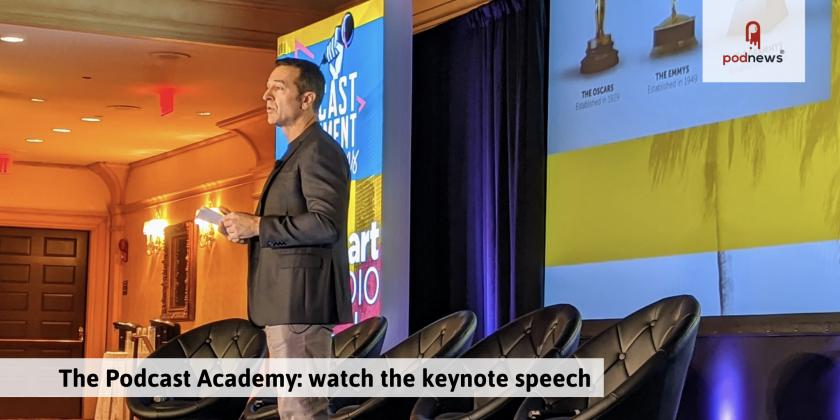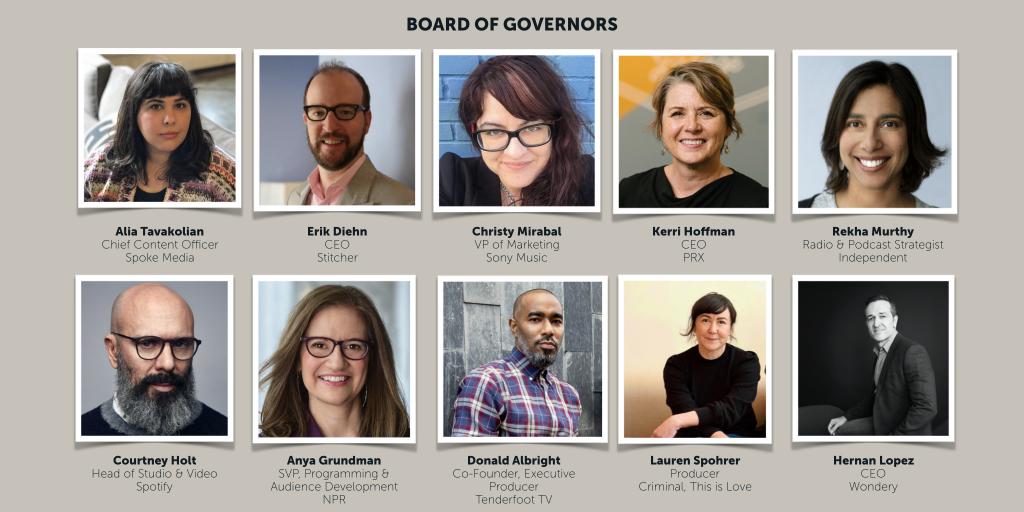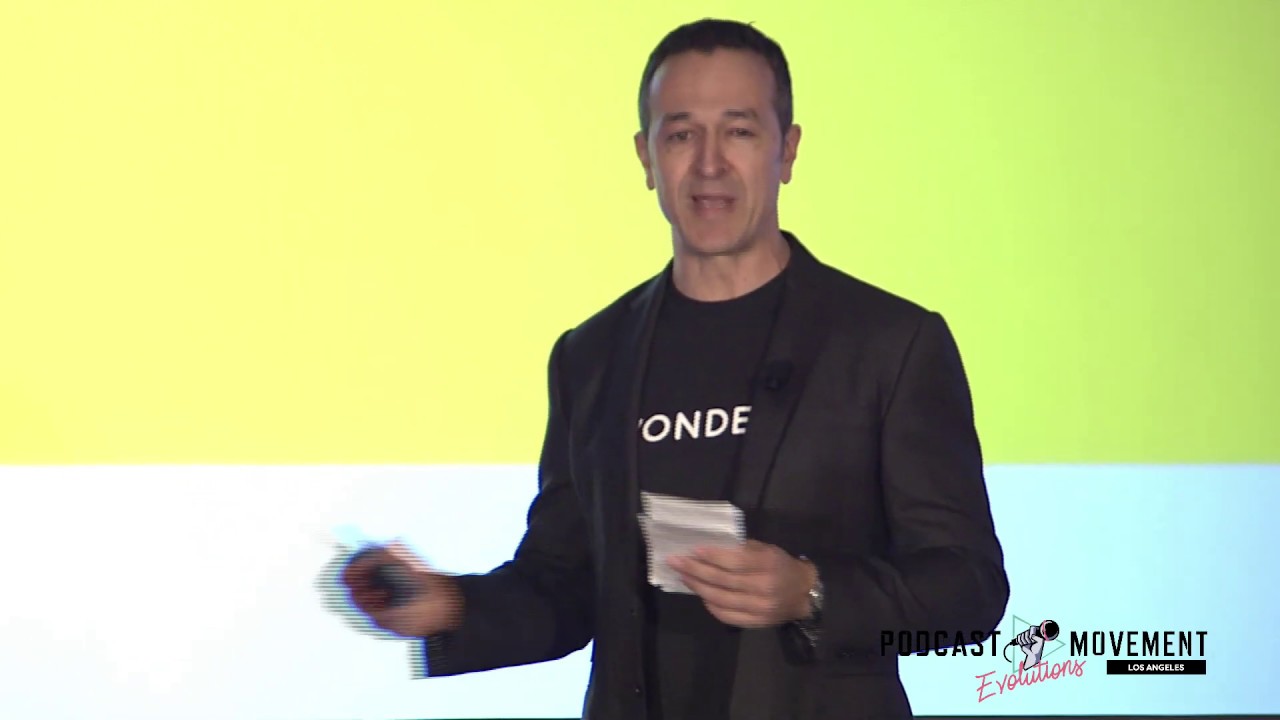
The Podcast Academy: Hernan Lopez keynote at Podcast Movement Evolutions

This article is at least a year old
Just a few years ago, all podcasts were art --- free, available everywhere, and independent. They also made little money. But over the last few years, podcasts have turned into a business, and many long-held assumptions are getting reshaped.
In this keynote, Wondery Founder & CEO Hernan Lopez will draw parallels to similar transitions in the worlds of TV and Film, unveiling a proposal to foster quality storytelling from all sectors, including public radio, networks and independents.
Video courtesy Podcast Movement: audio in Feb 16th edition of the Podnews podcast if you prefer that
Speech Transcript
Good morning, everybody: thank you for being here so early.
I’m happy to be here in this room; I’m excited to talk about the art and business of podcasts. First - let’s start with an anecdote.
Once upon a time, there was a Podcast Paradise…
A beautiful place where all podcasts were free, and available everywhere. They were supported by very few host-read ads at high CPMs, and some listener donations here and there.
Platforms in this paradise promoted all podcasts equally without favoritism. Somebody would just launch a great show from their garage, and they would organically rise to the top of the charts, and get hundreds of thousands of listeners, and everything would be great.
In this paradise, podcasts were art and expression, and everything else was secondary.
But not everything was perfect in this podcast paradise. The money wasn’t that great: after all, they didn’t know anything about their listeners. We were tired of reading the same ads over and over, and to much of the world, podcasts earned little or no respect.
And then one day, aliens arrived in space ships adorned with dollar signs. They brought big names, and marketing, and brands. They kept talking about “scale”, and “brands”, and “big names”, and they had their agents, and their talent. Quality did matter to them of course, but so did many other things that mattered in other kinds of media, like marketing, and editorial recommendation, and algorithms, and tech, and windowing, and exclusivity.
So one of the oldest inhabitants of Paradise confronted one of the aliens, and he told me - I mean, he told him:
“Why are you even here? We were here before you --- we created podcasts out of nowhere! We don’t need your big names, your promotion, your technology, your walled garden. All they do is create confusion, make life more difficult for us, and dissuade new listeners from coming in. You are ruining our paradise!”
And the alien responded --
“Well, but you kept complaining about everything. You said that the money wasn’t that great, you said you didn’t know anything about your listeners, that ads were the only revenue stream; that ‘discovery was broken’, and that you were tired of reading the same ad for Blue Apron over and over.”
Then, he pointed at a quotation of Howard Stern (“Podcasts are for losers”, from 2015) and said,
“You wanted to be taken seriously, right?”
(Nobody’s laughing at that one. This is an actual quote from 2015. He doesn’t say that any more.)
Well, it turns out, paradise wasn’t paradise and aliens aren’t aliens. What’s happening today is that a great form of art is now nurturing a business.
And that’s not only to be expected, but celebrated -- because it’s happened to every type of art before us.
Every form of art at some point was not taken seriously.
Theater -- in 1642 the English Parliament ordered theaters closed, for portraying "lascivious mirth and levity”.
Movies. “The tastes of this seething mass of human cattle have dominated”, said a 1910 article in Moving Picture World.
And… television had some of the best descriptions. “Opioid for the masses”. “The dumb box”. “The vast wasteland”.
Not that long ago, if you were an A-list feature film actor or director, you would never deign to work in television.
Things change.
And things are changing in the podcast world.
For the better.
Those of us who are lucky to be in the podcast industry have several things going for us.
First, podcasts are a deeply intimate, immersive medium. You guys all know that.
When we’re watching the Dirty John TV show, our brain can tell that we’re not actually looking at Debra Newell, but we’re looking at an electronic picture of Connie Britton pretending to be Debra Newell.
But when we’re listening to the Dirty John podcast, not only our brain knows the real Debra Newell is talking – it actually thinks she’s right there talking to us directly.
Podcasts are deeply intimate and immersive.
Last year, Mindshare did a neuroscience study comparing the emotional power of audiovisual stories to audio-only stories: they found audio alone has 89% of the emotional power of audiovisual.
Second, podcasts don’t require our eyes -- I know that sounds obvious, but in today’s world that’s a huge competitive advantage.
Today, our eyes are being bombarded with more and more options. More television shows of better quality than ever. Social media. News feeds. Games. Electronic billboards. On smartphones, and tv sets, movie screens, on the street.
Against all that competition, podcasts provide relief from that visual onslaught.
There’s something else that’s happened that’s really changing peoples’ propensity to listen to podcasts. Smart hearable devices, like Airpods, are really bringing new listeners to the podcast world.
Emarketer predicts that 230 million people will own an AirPod, or another smart earphone device by the end of this year, up from 120m last December. This bodes well for podcast listening.
Third, podcasts can still be produced and launched by a single person with enough drive, talent and motivation.
It goes without saying that I believe that in every area of life – including podcasts -- a team of talented people can achieve more than a single talented person can.
In all of the other forms of art I mentioned before, it takes a lot of people, and a lot of capital, to have a great work of art come to life.
Take television.
A TV show takes three years, two hundred people, and around fifty million dollars, before marketing costs from idea to air.
A movie in the US can cost hundreds of thousands or hundreds of millions of dollars – they take years to make, sometimes ten years, and most never get theatrical distribution.
Theater. You’ve probably heard this one: what’s the best way to become a millionaire? “Start as a billionaire, then invest in theater.”
But investors still do it – because they love theater, the art form.
Now, there are exceptions – you can still write a book or record a song pretty much on your own. Budgets are not necessarily the problem. Finding an audience is.
Podcasts, on the other hand, are in this incredibly unique position.
Today, a podcast made by a single person can sit alongside a podcast made by a company like Wondery, or even a bigger company like NPR, and beat us on the charts.
They are even justified to feel “Chartenfreude”: the feeling of satisfaction you get when someone else’s podcast is low on the charts.
(You feel it, right?)
And it’s close cousin, “Ratingfreude”. Doesn’t need explanation.
For the record, I never feel that. Because I do want this competition to continue.
I do want independent voices to thrive, to be able to create their own podcast, get a massive audience, and decide for themselves whether they want to sell their ads directly, partner with a company like ours or Stitcher, or make their show exclusive to a paywall, get donations through Patreon, be part of a bundle like Wondery+, or any combination.
It is YOUR SHOW. YOU should decide what to do with it.
But we, podcast makers: even though we do have lots of things going for us, we don’t have everything.
But we also have 800,000 podcasts (and growing), and many different ways to signal quality.
Rankings and consumer reviews are one way, but they’re not enough.
Critical reviews are not widely read yet: we don’t have the equivalent of the New York Times reviewers of books or movies.
Word of mouth is hard to scale.
But there’s one way to reward quality which movies, TV and music all adopted early enough in their histories, which podcasts yet don’t have.
The Oscars. Established in 1929.
The Emmys. Established in 1949.
The Grammys. Established in 1959.
All of these awards have something in common (besides starting in a year that ends in nine).
They’re given by a member-based not-for-profit organization, respectively: The Academy of Motion Pictures Arts and Sciences. The Television Academy. The Recording Academy.
Members of each organization are professionals who are actively working in their industry, primarily in creative roles, but also supporting roles. They’re all part of Peer Groups – Directors, Actors, Performers – who vote in their respective technical categories and also in the general awards.
Members of these organisations are people, not companies. These are not trade associations.
They’re broad. The AMPAS has over 6,000 members, the TV academy has 15,000 and the recording academy has 25,000.
They’re known for the awards, yes, but they’re also professional development and to some extent networking organizations. A member of the TV Academy - I was one, briefly - is a proud member of the TV academy.
These organizations were formed early in the history of their industries. And were created to celebrate and foster quality, not numbers.
So that’s one thing podcasts don’t have.
Or rather, didn’t have.
Until today.
I wanted to invite three amazing amazing industry peers to join me on stage.
Kerri Hoffman, CEO of PRX.
Christy Mirabal, VP of Marketing Sony Music.
Alia Tavakolian, chief creative officer of Spoke Media.
[Applause]
We are part of the Board of Governors of the newly created Podcast Academy - The Podcast Academy.

[Kerri] The inaugural Board of Directors includes a number of other amazing professionals. We have Erik Diehn from Stitcher, Courtney Holt from Spotify, Anya Grundmann from NPR, Donald Albright from Tenderfoot TV, Oren Rosenbaum from UTA, Lauren Spohrer from Criminal, Rekha Murthy and other independent professionals joining our board. We’re really excited to include them.
[Christy] We’re going to be an Academy that’s welcoming of all members, from hosts to producers, to writers, from sound designers to reporters, from creative to marketing and PR executives, and professional representatives.
[Alia] And - an academy, that hopefully, will include every person in this room today.
[Hernan] And an Academy, that every year, starting in 2021, will present the first fully representative peer-based award ceremony for the podcast industry called The Golden Mics.
(A Q&A followed, available in the video above, which has auto-generated subtitles)
Above text from delivery and original speech text

































































































